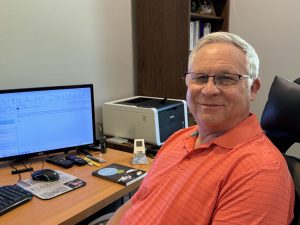HIHIM professor Jim Condon reflects on his multi-decade career path from Army veteran to cancer registrar to academic. He explains why veterans should consider careers in health information management, and why cancer registrar is such a promising job for HIHIM graduates.

Born and raised in the Seattle area, M/HIHIM faculty member Jim Condon joined the Army at 18 and served for 21 years. He always hoped to return to his hometown, but wasn’t sure how to find a civilian job after spending years specializing in missile artillery.
“There are transferable skills that people of any branch of service bring, like professionalism, a good work ethic, leadership, and motivation. So I knew I had those transferable skills, [but] I needed to align those with something that I found interesting,” he reflected.
After ending his deployment in Georgia, he pursued a degree in health information management at the nearby medical college. Condon soon entered the cancer registry field, which involves collecting and processing cancer data in order to form a picture of cancer rates across the country. Having lost family members to cancer, he found the work profoundly meaningful.
“Here’s a way I can help in the fight against cancer by acquiring and making sure that data were available to the people who do the research and who treat patients who have cancer. So that’s why it became such an interesting and fulfilling job for me.”
The Oncology Data Specialist (ODS) credential, formerly called the Cancer Tumor Registrar (CTR), “sets the standard for professional competence in the cancer registry field,” according to the National Cancer Registrars Association. As HIHIM Program Director Dr. Karima Lalani explained, “It is a pathway that can be pursued by those who are pursuing education in the HIHIM field.”
As a cancer registrar, Condon utilized the detail-oriented thinking that had served him so well in the Army. He recalls the moment he discovered that the former cancer registrar at his university had mixed up a town and a county with the same name, distorting the dataset. After doing more digging, Condon corrected tens of similar errors.
“It made me feel better that our database accurately reflected where those cancer patients came from,” he said. “Attention to detail is knowing your data and asking questions, knowing about geography, and just really looking at all of those data fields and recognizing, ‘Hey, this is a data field that could be troublesome.’”
In 2013, he completed his dissertation in educational leadership, which focused on the national cancer registrar credentialing exam. In the process of contacting 56 bachelor’s degree program directors across the country for research purposes, he fortuitously struck up a longer conversation with the UW program director. She suggested Condon apply for the new HIHIM faculty position, and in 2014, he returned to Seattle at last.
What Does a Cancer Registrar Career Look Like for HIHIM Graduates?
Since then, Condon has taught numerous HIHIM courses and served as HIHIM Program Director. He has witnessed the growth and transformation of the field as a result of the internet and the move to electronic records. When he got his start, the term “health care informatics” didn’t even exist, he said. With cyberattacks worryingly on the rise, it’s more important than ever that HIHIM professionals know how to keep sensitive data private and secure.
Condon has also recruited veterans to the program, and even published a study laying out the rationale for hiring “excellent” veterans in HIHIM. As a liaison for retiring military personnel seeking to start the next phase of their careers, he gives seminars at Fort Eisenhower and provides tours of HIHIM departments. Condon particularly encourages veterans to specialize in cancer registrar work, which is one of the most common careers for HIHIM graduates. Many go on to analyze and visualize cancer data for organizations like the Fred Hutchinson Cancer Center.
He explained, “I was able to form a bond or rapport with [veterans] and tell them how their transferable skills match up nicely with a position in health information management and the cancer registry.”
Condon plans to retire in the next year, while continuing to teach at UW on an adjunct basis. He has plenty of items on his bucket-list, including making improvements to the dream house he built in Port Angeles with his wife during the pandemic, and attending drive-in movies in his beloved 1964 Chevrolet Corvette. Not to mention joining his wife on her work trips to Alaska and Hawaii.
“That’s gonna keep me busy for a few years anyway,” he said.